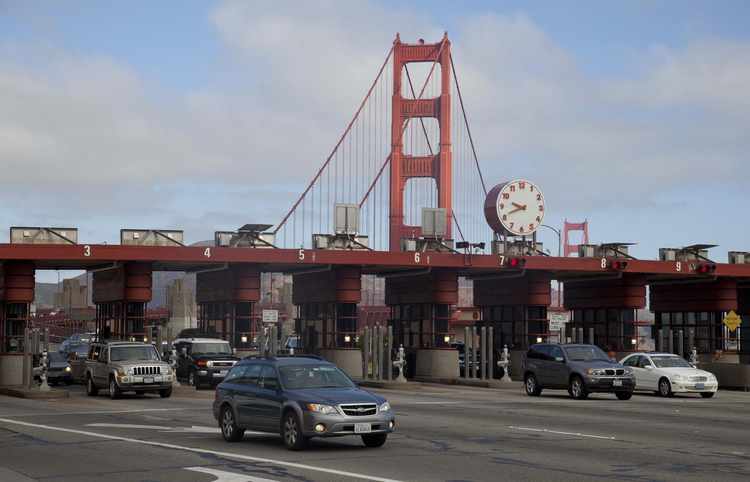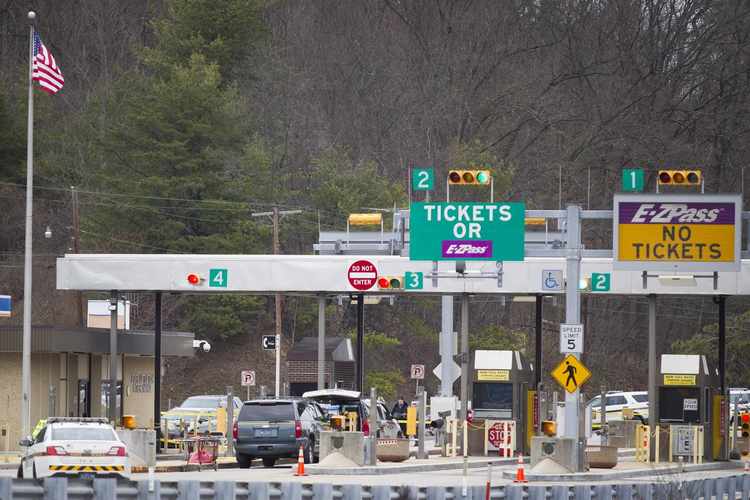Pretty soon the toll house may not signify much more than a cookie: Electronic cash is fast becoming coin of the realm on the road.
Colorado and Massachusetts have already nixed cash, Washington state has just one bridge left that accepts coins, and the bridges and tunnels connecting New York City to the suburbs are scheduled to be entirely all-electronic by the end of this year. Today, some form of electronic tolling is available in all 34 of the states with tolls, as well as Puerto Rico.
All-electronic tolling (AET) reflects a broader movement toward cashless transit, with subway and bus systems in most major cities now using cashless card systems. Faster, more efficient and greener (no more idling at the booth), it also symbolizes the modern preference for interacting with faceless machines rather than other people – just ask your friendly (if mute) neighborhood ATM.
Nevertheless, no-cash tolling raises a range of concerns. While governments tout the ease of EZ Pass and systems like it, they are also effectively changing the rules of the road: To travel on many public highways, citizens must now provide toll agencies – read: the government -- with access to their bank accounts or credit cards for automated payment.

Motorists must also place a transponder in their car enabling the government to track their movements — or else be tracked by electronic license-plate readers. On top of that, there are worries that all-electronic tolling could become another way an increasingly tech-stratified society discriminates against the poor, despite discounts or accommodations made.
Transponder-based systems, like the Northeast corridor’s EZ Pass, have delivered on their promise of toll convenience for decades -- not only reducing road delays (in New Jersey, by an estimated 2 million vehicle-hours per year), but, according to some studies, reducing emissions and even improving infant health outcomes in families living near toll plazas.
What’s new is the elimination of the cash option, and the involuntary surrender of privacy.
“If there’s going to be a system of electronic tolling which builds up a record of where you are and sheds a lot of light on your day-to-day activities, it ought to be a matter of opt-in consent,” said Adam Schwartz, senior staff attorney at the Electronic Frontier Foundation.
Toll records are perhaps smaller fry compared to all the other overlapping electronic data sets created by the average American -- cellphone records, credit card transactions and the like. But while Amazon and Google know a lot, they are not the government.
And transponders track more than just toll stops: They are increasingly read here, there and everywhere to gather real-time data about driving conditions. Florida experimented as early as 2004 with monitoring transponders on highways, a program that Central Florida Expressway Authority Senior Communications Specialist Brian Hutchings said is now an “industry norm.” New York City has an even more intrusive system of microwave sensors and traffic cameras that gather real-time data about driving conditions.
Most drivers don’t even blink when considering the loss of a little bit of locational privacy in exchange for convenience, such as having Google Maps plot a detour around the worst of the late-afternoon traffic. Indeed, consumers have come to expect the personalized experiences enabled by data-gobbling smart tech, but are often unaware of the fine print of that tradeoff.
While AET systems reduce the time it takes to pay a toll, they may be encouraging the addition of toll roads. An analysis of highway data between 2003 and 2013 showed that tolled mileage grew 15 percent in that time, even as the highway system as a whole only grew 3.6 percent.
All this electronic tolling creates troves of data, which creates a new need: protecting that data. Recent hacks of Equifax, state voter systems, hospital records and even HBO employee data show that this isn’t easy.
Forsaking the transponder may reduce government tracking, but it doesn’t eliminate it as cameras take time-stamped photographs of license plates at toll plazas in order to bill roadway Luddites.
These drivers are often charged more for not embracing the future. The mark-up varies from state to state. In southeast Florida, for example, drivers who aren’t plugged in to the SunPass transponder system are usually charged about 25 percent more in tolls for the same route. When the bill arrives in the mail, it carries a $2.50 service fee.
If this seems unfair, it’s not supposed to be -- it’s just economical.
“Cash tolling is very expensive, very labor intensive, and historically there are lots of problems with cash going astray,” said Robert Poole, director of transportation policy at the Reason Foundation. Until the 1990s, the cost of collection could amount to as much as a quarter of toll revenue, but electronic tolling promised to continue shrinking that down -- perhaps to as little as 5 percent.
But don’t expect this increased efficiency to mean that toll rates will go down. An MIT study found that the move to electronic tolling makes it easier for the state to slip rate hikes past drivers.
Plus, too cheap equals too many cars on the road. “The goal is to keep traffic moving because that’s the value of paying a toll over the freeway system,” said Lisa Telles, chief communications officer at the Transportation Corridor Agencies in California. “Part of the toll rate is to ease congestion.”
Hidden rate hikes make all-electronic tolling potentially troublesome for lower-income drivers already weighed down by so-called “policing for profit” strategies that rack up fees for low-level traffic offenses.

Moreover, as with any complicated bureaucratic endeavor, it’s easy to wind up afoul of the system even while trying to play by the rules. One Orange County couple whose debit card expired racked up $49,000 in fees and penalties.
Nevertheless, electronic tolling can accommodate drivers of lesser means. Los Angeles offers a $25 credit to lower-income people opening a FasTrak account for tolled express lanes. Fare reductions for lower-income commuters, such as those seen in other paid transit forms (for example, Seattle’s Orca Lift program) are also a possibility.
Looking forward, though, the potential for e-tolling mission creep is real.
Shankar Narayan, director of the technology and liberty project at the Seattle-based American Civil Liberties Union of Washington, referred to a program in his state in warning that the past of traffic-regulating technologies could be prologue.
“I think the situation with red light cameras is very instructive, because the legislature put similar restrictions around using data -- and prosecutors came back to the legislature to ask for use in prosecuting criminal cases,” said Narayan.
Massachusetts, which is still finishing up the “toll plaza demolition” phase of the state’s conversion to all-electronic tolling, in October rolled out a vehicle tracking system that piggybacks on the Massachusetts Turnpike’s e-tolling infrastructure. Authorities have used the enhanced surveillance capabilities of the system on seven occasions, notably capturing an accused child rapist and gun thief who escaped detention last New Year’s Eve.
Future upgrades could get law enforcement even more involved in the tolls. Gov. Andrew Cuomo is looking to extend the revolution of New York City’s toll infrastructure -- all the way to facial recognition technology at tolls and other strategic checkpoints.
Narayan said that the Washington state experience was proof that putting protections in place, such as requiring records be deleted and forbidding pictures of faces, could make it possible to protect privacy as new, invasive technology grows. But it’s easy to get greedy with all that info.
At the moment, facial recognition enhancement and the like are only possibilities, not reality. But the allure of modern life’s convenience-enhancing, data-accumulating consumption habits often engenders a “so what?” reaction to the increased surveillance that accompanies convenience. Will tolling be any different?
Michael Manville, assistant professor of urban planning at UCLA, doesn’t think so. “Personally, I think privacy is important, but my sense is that most of the American public doesn’t,” he said.
Correction: Sept. 12, 2017, 11:40 AM Eastern
Because of an editing error, an earlier version of this article used an incorrect gender possessive in referring to Shankar Narayan. The ACLU official spoke of a program in his state of Washington, not "her state."



